In a world in which a 1976 Apple-1 computer can fetch $375,000 at auction, it’s not exactly news that people appreciate the value of our technological heritage. But Ariel Fischman, a financial advisor in Mexico City, isn’t just another collector of vintage PCs. Fischman collects spreadsheet software—boxes full of disks, manuals, and other accoutrements that were standard fare in every office until we started downloading most of our apps. It’s a surprisingly rich hobby, given that the 1980s and early 1990s saw booming competition among software giants, startups, and even unexpected contenders such as Boeing (yes, the aircraft company).
There may be other spreadsheet collectors out there, but only Fischman has been recognized by Guinness World Records as having the largest such collection on the planet, an honor he received in May of last year. I spoke with him about his trove, how he assembled it, and why a seemingly mundane piece of business software sparked his imagination.
Fast Company: Why don’t we start with the most obvious question. Why spreadsheets?
Ariel Fischman: I’m a corporate financial advisor, and I’ve been a user of spreadsheets for close to 30 years. One day I was just thinking: Many people use these, and they save so much time from using them, especially as compared to what was available before. So I decided to research a little bit about the history of spreadsheets. And if you go online, there isn’t anything too formal on how they came to be. I decided to focus a bit of an intellectual interest in understanding the history of where they came from and how they got to be such a popular tool.
In all honesty, it wasn’t supposed to be a collection at the beginning. I’m not the kind of person that would have, like, a Star Wars collection. I just wanted to find the oldest spreadsheets that I could get my hands on. I found one, and then another, and then quickly discovered that even within Microsoft there was something before Excel called Multiplan. I don’t even know when exactly I decided it would be a collection. I just continued to buy stuff, and I’ve bought as many as I can get.
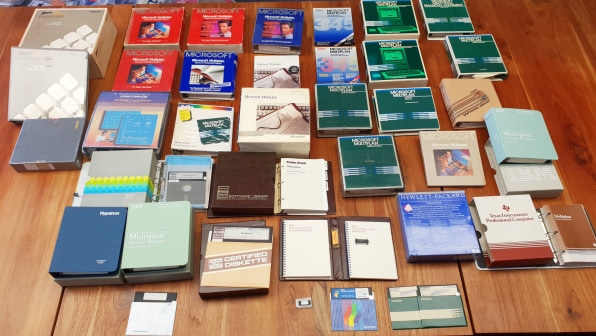
FC: Once one sets out to collect spreadsheets, where does one get them?
AF: I’ve bought a lot through eBay. I’ve also invested quite a bit of time in reaching out to the people who did reviews of the software for magazines, mostly in the ’80s and early ’90s, and the people who were on beta tester lists. They’ve been able to send me the rarest items. I have a bunch of demos. Disks with stamps labeled “confidential.” A lot of pre-releases, undocumented, that never went out to the public.
FC: How many spreadsheets do you have?
AF: Unique items? Close to 800. The official Guinness record count is slightly higher than 500. They’re very strict. They don’t count a disk without a box, for example. And there’s disks that were distributed without a box, because many people programmed software out of their garage and sold it by mail. They were never displayed on shelves.
The records team also didn’t count any demos. And I must have three digits of demos. They decided those don’t count because they had limited functionality. The way I see it, if it’s a grid, if it captures numbers and text, if it performs arithmetic calculations, it’s a spreadsheet.
The process to attain a Guinness World Record is very complicated. It took me over two years of gathering documentation and letters and recommendations from people in the computing history world.
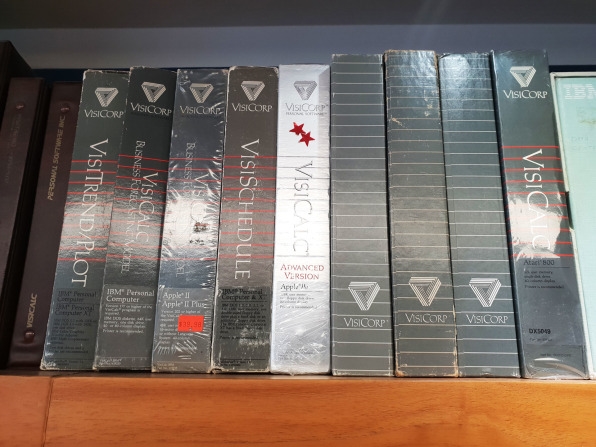
[Photo: courtesy of Ariel Fischman]
FC: Is there such a thing as a valuable spreadsheet?
AF: There are some that have cost me a lot of money. One person that I bought a few items from owns a lot of software from the first half of the ’80s. She has things I haven’t been able to find anywhere else, and she’s conscious of the imbalance between supply and demand. Not that the demand is so high, but even one person is demand, and that would be me. I’ve paid close to four figures for some items.
FC: All it takes is one fanatic.
AF: Yes, exactly.
FC: How do you even gauge what’s out there to collect? Are there things you know existed that you’ve been unable to find?
AF: I started looking for only stand-alone spreadsheets: Excel, but not the entire Microsoft Office package. And then I opened the spectrum to suites that are not stand-alone spreadsheets. Microsoft Works is an example. It’s a suite, and the spreadsheet itself was not sold on its own. That also applies to the 2016 and 2019 versions of Excel. There is no physical media for Excel stand-alone, only for Office.
There’s one item that I haven’t been able to find that I know existed: Excel 2001 for the Mac. I have the Office version and I’ve seen pictures of the Excel stand-alone version. I’ve spoken with people at Microsoft; they searched and said “Sorry, we don’t have it.”
FC: Of the spreadsheets you do have, do you know which ones are rarest? I know you’ve got a lot of betas, which by definition are fairly rare.
AF: Yeah, I think those are the rarest. For example, I have two versions of Excel beta from 1985 with their respective documentation. But I bought the disks and documentation from different people. It was just a happy coincidence that I was able to match them.
The other family of rare products is Microsoft’s Multiplan. I exchanged some emails with one of the people who headed the development of Excel and worked on Multiplan as well back in the ’80s. He mentioned an unsubstantiated claim that Multiplan was the program that was ported to the most architectures. I think I have close to 40 versions of Multiplan for different operating systems, including some very strange computer architectures.
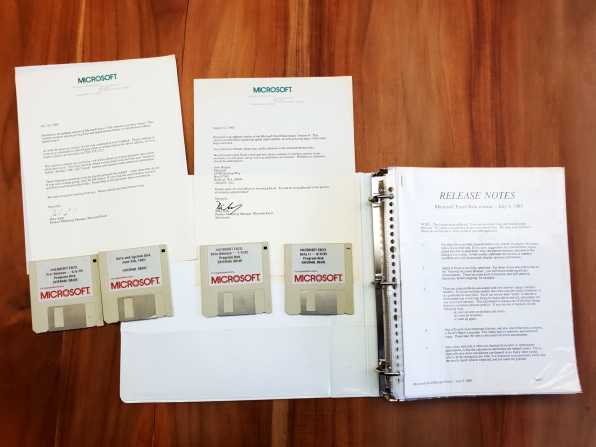
[Photo: courtesy of Ariel Fischman]
FC: I always thought that Multiplan was a flop. But when I looked at Wikipedia, it said it sold a million copies, which doesn’t sound bad for the early 1980s. Do you have a sense as to why it went away and Excel came around?
AF: The explanation that I’ve put together on my own—it’s really a hypothesis—is that Multiplan was sold in so many different versions that it must have been difficult to control quality and releases. It’s not that they didn’t sell enough, it’s just that it was hard to manage.
Excel wasn’t really a strong replacement to Multiplan, in my view, until version three. There were spreadsheet wars in the 1980s, where the front runners were Lotus 1-2-3, Excel, Superplan, and Borland’s Quattro. The differentiating factor that led Excel to win that war would be that the fact that Windows 3.0 came out in 1990, and Excel was native. It simply made more sense to have the two products that matched, and Windows 3.0 was a winner in the operating system war.
In the early days you just went to the neighborhood store and bought whatever the clerk recommended. With the interconnectivity of computers, it became more relevant to have something that was compatible with what everyone else had. If everyone had Windows, Excel was the more obvious choice.
FC: Lotus basically bet on IBM’s OS/2 operating system, which turned out not to be a great idea. They spent years trying to play catch-up on Windows, and by then it was probably too late.
AF: Correct. Plus, the obvious point is that Excel and Windows were made by the same company.
FC: Do you actually run any of these old spreadsheets? Do you have old computers around, or is it more about the physical products?
AF: It’s more about the physical product. I’m sure that because of the humidity of the places where they were stored and simply the passing of time, many of them probably wouldn’t work. I’ve played with a few, in cases where you can emulate the original operating system, but it’s really a limited number. So I have to base my opinions on the documentation that each product has.
In most cases, I have the boxes, books, and booklets. They’re interesting to read. In the end, out of the literally hundreds of different products, the bloodline is the same.
FC: Do you have a favorite out of all of them?
AF: I used Lotus 1-2-3 back in the day. But Excel is the tool that, for me, really made a difference. It’s the top-of-mind spreadsheet. It’s what most people use as their default. There are online spreadsheets today, like Google Sheets, and even Office 365 now comes with an online tool. But Excel is the standard. If you know how to use it well, you can move from one job or one business to another, and it’s to a certain extent universal.
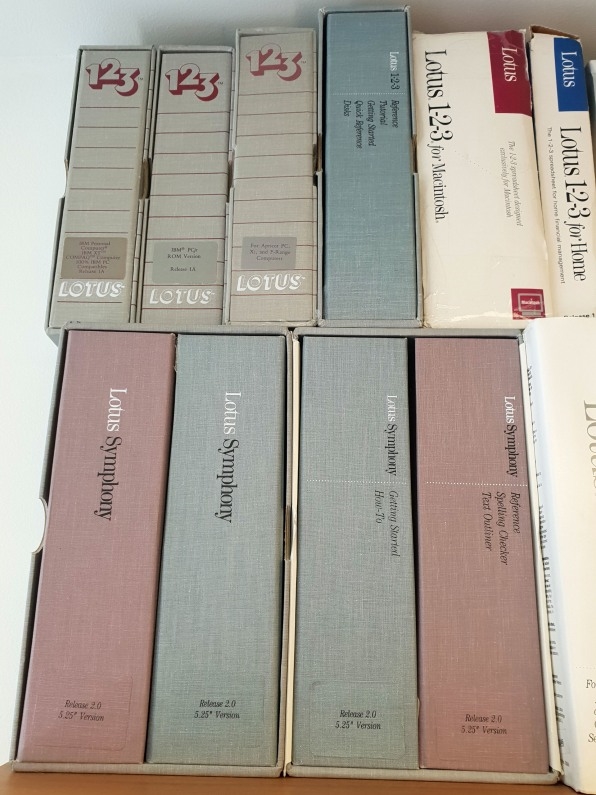
[Photo: courtesy of Ariel Fischman]
FC: Products like 1-2-3 used to come in really nice cloth boxes, and the documentation was great, and over time, the manuals got bigger and bigger. They were these impressive physical products, and that’s almost totally gone away. Do you have interesting examples of packaging from the old days?
AF: I have a ton of those Lotus cloth boxes. There were some that had really interesting art. But we live in a different time right now. If you buy Office today, it’s either a download or an empty box with a card with a key number in it. You’re not even buying media. You’re buying a license.
FC: You also paid hundreds and hundreds of dollars back in the day, compared to today when you’re either paying a little bit of money, or in some cases no money if you’re using an online spreadsheet.
AF: They were expensive items. Before 1979, people didn’t have a reason to own a computer. And when VisiCalc came out, they understood why they’d want to use one. People started buying $2,000 computers just to use VisiCalc. If you pay attention to advertisements for personal computers in 1980, 1981, the way they would advertise their computers was, “Ours is the best to run VisiCalc.” It was that interesting.
FC: I was trying to remember if any of the old spreadsheets are still out there other than Excel. I realized I wasn’t sure if Quattro Pro was around. I looked at the Corel site, and it is, as part of the WordPerfect suite. Do any of the other 1980s and 1990s contenders still exist?
AF: I don’t think so, not the old ones. There’s definitely competition, but when compatibility is so critical, it’s basically down to Excel, Numbers, Google Sheets, and there’s a few out there that are more specialized.
FC: Was it better for spreadsheet users back when there was lots of competition?
AF: In all the economics books, we read that monopolies are detrimental to development and research because essentially the monopoly company can sit in a comfort zone without any need for innovation. I try to be as unbiased as I can with this comment, but the reality is that Excel innovates all the time. I don’t think that we have lost the innovation edge from going from a market with dozens of competitors to one with one, two, or three companies. Again, to my point on compatibility: If you want to create a file and share it with someone else, you couldn’t unless they were using the same software. I don’t think we’ve lost anything. With some products, it’s better not to have too many choices.
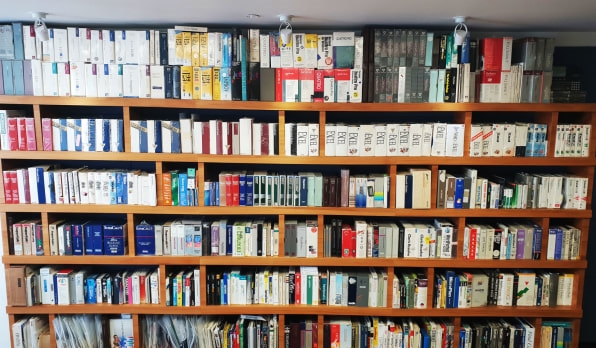
[Photo: courtesy of Ariel Fischman]
FC: What else have you learned from this collection?
AF: Not to take any credit at all away from [VisiCalc creators] Dan Bricklin and Bob Frankston, but I think there are other people in history who should also be recognized for their contributions. There was an article in the Journal of Accounting in 1961 by an academic named Richard Mattessich. He’s in his mid-90s now; I’ve exchanged emails with him. He conceptualized the spreadsheet way before computing power was able to execute it. He wrote in his paper that we were going to be able to use computers to perform business forecasts and budgeting. Essentially, he describes what a spreadsheet was going to be almost 20 years later.
Also, in 1969 Rene Pardo and Remy Landau created LANPAR, which I understand was sold mostly to telcos. Rene told me some time ago that the original software was on paper tape since they were paranoid that it could would be stolen by the service provider. They had several thousand lines of code running in 32K of memory, and they would compile the code and store it on a GE 200/400 or Honeywell 6000 computer. I believe they deserve significant recognition as well.
People in the earlier days were already thinking about this, and the uses it could have. That’s definitely one thing I’ve learned—not through collecting, but from my research.
I have no interest in selling my collection. Right now, I enjoy seeing it in my office. But eventually, I’ll just give it away, if some institution wants it. I think it’s the right thing to do. Physical spreadsheets are finite; they’re getting close to their end.
(48)